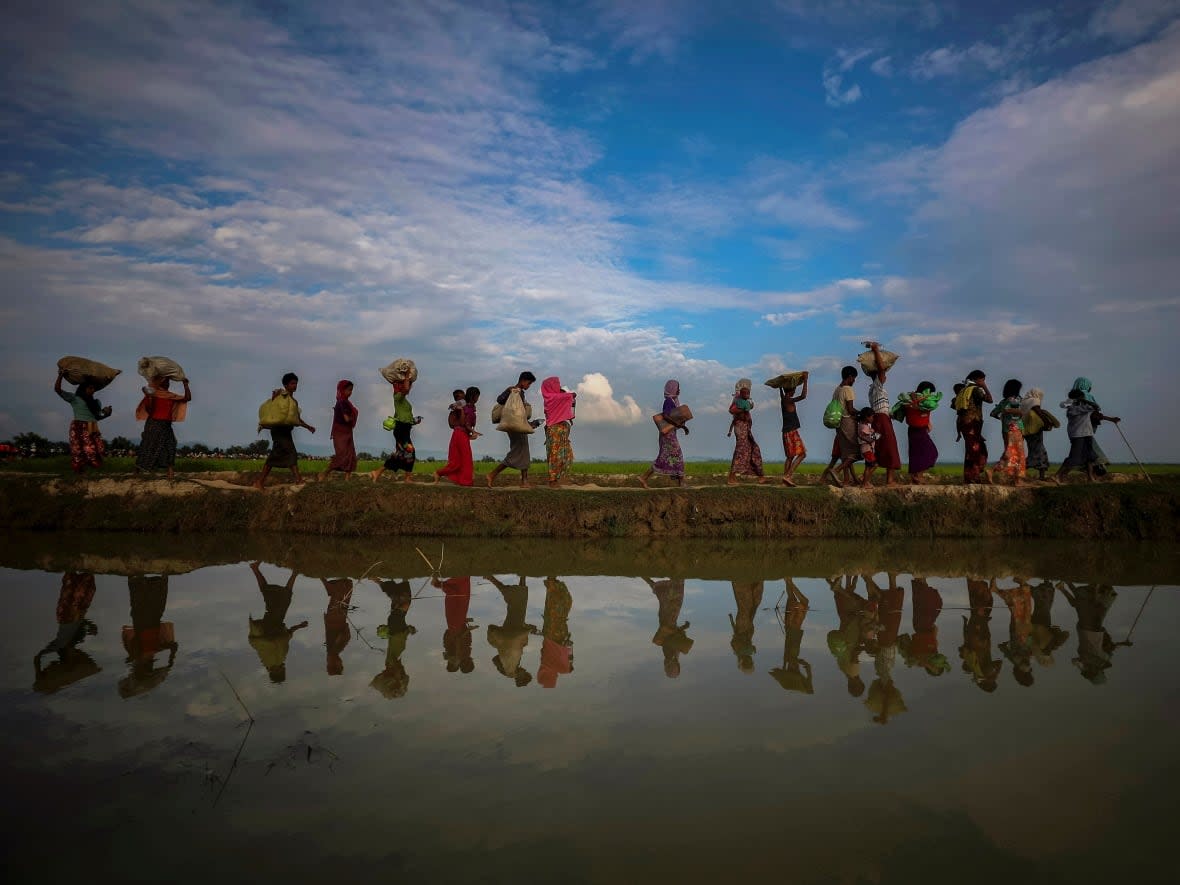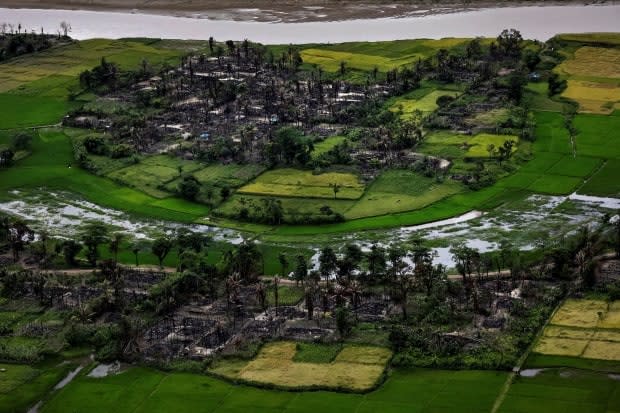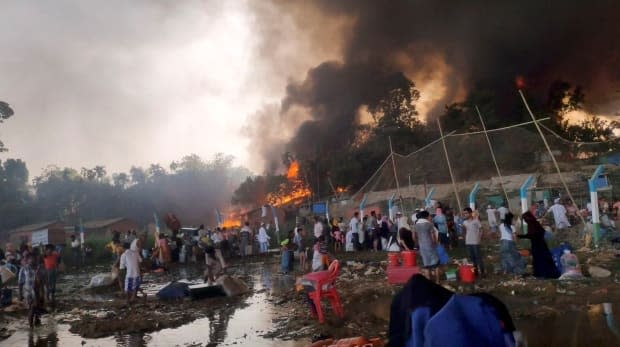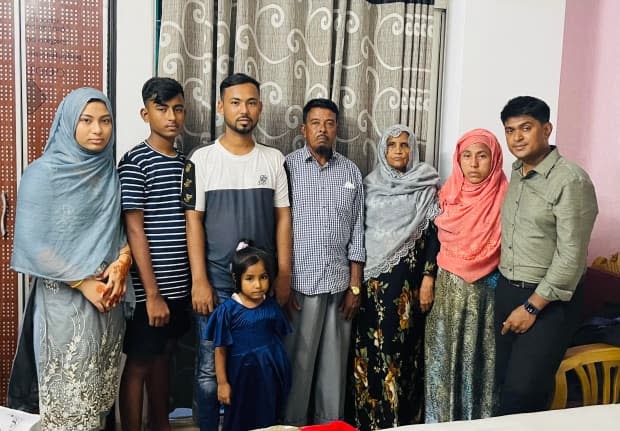Canada's Rohingya fear world has forgotten refugee crisis 5 years after genocide in Myanmar

The final week of August will mark both happy and horrific moments in Mayyu Ali's life — his arrival in Canada as a refugee one year ago and five years since the start of a brutal military crackdown that forced him to flee his home in Myanmar.
Ali is one of the hundreds of thousands of Rohingya — a long-persecuted, predominantly Muslim, ethnic minority group in the Buddhist-majority country — who fled a campaign of violence against them, beginning on Aug. 25, 2017.
The military began carrying out what it called "clearance operations" against a Rohingya rebel group that had attacked police posts; Canada, the U.S. and other countries say what unfolded was genocide.
In the months that followed, more than 700,000 Rohingya refugees streamed into Bangladesh, according to the United Nations' refugee agency; some 300,000 Rohingya who arrived in previous cycles of violence were already living in camps.
There was no mass resettlement of refugees in safer countries, like Canada, as seen with other crises, such as the wars in Ukraine and Syria, and Ali is one of a small number of Rohingya to settle in Canada in the years since that crackdown began.
He and other Rohingya living here worry the world has forgotten the plight of their people.
With Myanmar, also known as Burma, in a state of turmoil since the military took control of the government in a February 2021 coup, the situation remains dire for the nearly one million Rohingya refugees registered in Bangladesh — and for the estimated 600,000 Rohingya remaining in Myanmar, facing continued hostility and living under tight restrictions.
"Nobody wants to be a refugee," said Ali, who worked for a humanitarian organization combating hunger before he escaped Myanmar's Rakhine state.
He said it was heartbreaking to leave everything behind in order to save his life.
WATCH | Mayyu Ali describes how attacks on the Rohingya began:
Plan of attack
Ali recalled waking up to the sounds of gunshots, in Maungdaw township, in the early hours of Aug. 25, 2017, when an insurgent group, called the Arakan Rohingya Salvation Army, that claims to be fighting to end the persecution of the Rohingya, attacked several police posts.
The military used the attacks as the impetus for a widespread crackdown on the Rohingya.
The Commission for International Justice and Accountability (CIJA), founded by Canadian war crimes investigator Bill Wiley, released a report released earlier this month concluding there was an organized plan in which "every effort was taken to dehumanize and persecute the Rohingya population, consistent with the specific genocidal intent to destroy the Rohingya populations."
Doctors without Borders estimates at least 9,000 Rohingya, including at least 730 children under the age of five, died in the first month of the military assaults — more than two-thirds of them as a result of violence — though the organization said that tally was conservative. Many more Rohingya were tortured, beaten or burned, while thousands of women and girls were raped, according to a study published by the Ontario International Development Agency.

A refugee for a second time
Ali was able to make it to Bangladesh, nearly two weeks after the violence erupted, crossing a river between the two countries, at night, in a small rowboat packed with 14 people. Though he was able to reunite with his parents and four of his siblings who fled separately from him — one sister remains in Myanmar to this day — the camps were not necessarily safe.
Living conditions in the sprawling refugee camp are squalid. The area is flood-prone and, with 60,000 people packed into each square kilometre, shelters are susceptible to devastating fires. The Bangladeshi government has also imposed restrictions on the refugees, limiting free movement, access to education, and the ability to make a living. The protracted crisis has also left the refugees vulnerable to violence inside the camps.

It was in the refugee camp where Ali's life again came under threat, he said, as he helped international human rights organizations documenting the testimonies of other refugees and the situation inside the camp.
He said he had to go into hiding until it was arranged for him to flee again, this time to southwestern Ontario. He, his wife, whom he met in the camp, and their now 18-month-old daughter, arrived on Aug. 28, 2021.
"I was on the plane and I pulled the hands of my wife, and we were looking at each other, and I was just telling her the hell is over."

Rohingya community in Canada
Ali and his family are now living in Ontario's Kitchener-Waterloo region, which has become somewhat of a hub for Canada's small Rohingya community.
Saifullah Muhammad, a former refugee who moved to the region in 2016 and helped start the Rohingya in Canada Centre, which opened in Kitchener in March, said about 1,000 Rohingya people have come to Canada since 2006.
The Canadian government would not confirm how many Rohingya refugees have come to Canada since 2017 when the military crackdown began. In an email to CBC News, Immigration, Refugees and Citizenship Canada would only say 300 Rohingya refugees were resettled between 2006 and 2010.
Muhammad, Ali and other members of the Rohingya community will gather at the centre on Thursday to commemorate the anniversary of the military campaign.
"We are marking these days so that all the future generations of Rohingya will know what happened to our people," said Muhammad. But he's worried by how little global attention is on the crisis five years later.
He visited family members in a camp in Bangladesh last month. He left the camp when he was five years old and it was the first time he had been back in nearly two decades.
"Most of the people who I met, they wonder whether the world has forgotten them," he told CBC News.

Canada's response to crisis
The Canadian government recently announced a new phase for its response to the Rohingya crisis and the post-coup situation in Myanmar, including $288 million in new funding over three years, and a promise to name a replacement for Bob Rae, who had been Canada's Special Envoy to Myanmar before he was appointed ambassador to the United Nations two years ago.
Global Affairs Canada didn't respond to requests for comment on when the new envoy would be appointed.
Last month, Canada reaffirmed its intention to intervene in an International Court of Justice genocide case, brought forward by The Gambia, that was recently allowed to proceed following an objection from Myanmar.
WATCH | Ukraine crisis shows how we can help refugees the world over, says UN refugees chief:


